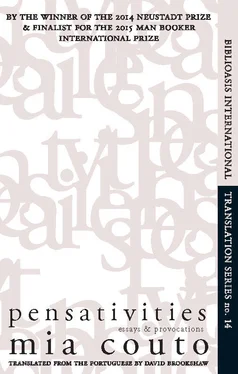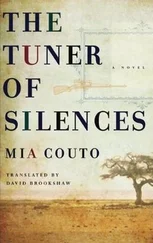Concepts must be vital implements in our search for our own image. But much of the conceptual framework we use to look at Mozambique is based on catchphrases which, because they have been repeated so often, have ultimately failed to produce any meaning at all. Let me give some examples. We talk a lot about the following:
traditional power structures;
civil society;
rural communities;
subsistence agriculture.
Forgive my offensive incursion into these domains. But I have heartfelt doubts about the operational viability of any of these concepts. I have doubts as to whether these categories suit us and produce real changes.
A Language Called “Developmentalese”
And this is what worries me — rather than encouraging innovative, creative thinking, we are working at a superficial level. Mozambican experts and specialists are reproducing the language of others, concerned with the ability to please and cut a good figure in workshops . It’s an illusion, a game of appearances, for which some of us are well prepared because we know how to speak a language called “Developmentalese.” Yet faced with the task of seeking meaningful solutions for national problems, we are as much at a loss as any other ordinary citizen.
Buzzwords such as good governance, accountability, partnerships, sustainable development, building institutional capacity, auditing and monitoring, equity, advocacy, all these fashionable terms give added value (there’s another fashionable term) to so-called “panel presentations” (in fact, one should really refer to them as “papers”). But if, when importing these value-added buzzwords, you don’t want to be in the same situation as a certain speaker I once saw, you should avoid word-for-word translation — I’ve already heard someone referred to as a painelista , which, apart from being not very nice, is a dangerous word. This speaker, to avoid saying that he was going to give a presentation using PowerPoint, ended up announcing he was going to give a presentation using his “powerful point.” This could be susceptible to malicious interpretations.
The problem with Developmentalese is that it only invites one to think what has already been thought by others. We are consumers rather than producers of thought. But it wasn’t just a language we created: we created a whole army of specialists, some of them with curious names. I have seen them in a variety of meetings: I’ve seen specialists in conflict resolution, conference facilitation, workshopping, advocacy, and political engineering.
We are committing our finest human resources to something whose use must be questioned.
The greatest temptation nowadays is for us to reduce issues to their linguistic dimension. We speak, and having spoken, we think we have acted. Often, the same word has danced with a vast number of partners. So many in fact that whatever the party, certain expressions always take to the floor first. One of these words is “poverty.” Poverty has already danced with “the decade against underdevelopment,” and later with another dancer, calling herself “the struggle against absolute poverty.” Also early to the floor are the people, though they specialize in masked balls. The people assumed the mask of “the popular masses.” The people have already been “the working masses.” After that they were “the population.” Now, they dance in the guise of “local communities.”
The truth is that we are still hugely ignorant of the current dynamics, the living, practical mechanisms that these so-called people invent in order to survive. We know very little about issues of urgent and primary importance.
It’s not only the young students who look at the rural world as if it were an abyss. For us too, there is a Mozambique that remains invisible.
More serious than these omissions is the image that has been created as a substitute for reality. It has become an increasingly common idea that development is the accumulated result of conferences, workshops and projects. And I know of no country that has developed on the basis of projects. You, more than anyone, know this. But whoever reads newspapers realizes how entrenched such beliefs are. All this merely illustrates the appeal of an attitude prevailing among us, which asserts that it is others (in our modern jargon, the “stakeholders”) who bear the historic obligation to haul us out of poverty.
Our Being a World: Seeking a Family
At a conference in which I took part this year in Europe, someone asked me: What is it, for you, to be African?
And I asked him back: And what, for you, is it to be European?
He didn’t know what to answer. Similarly, no one knows exactly what is meant by African identity. There’s a lot of dross, a lot of folklore, within this spectrum. There are some who say that what is “typically African” is that which carries a greater spiritual weight. I’ve heard someone say that we Africans are different from others because we give far greater value to our culture. An African specialist at a conference in Prague stated that the measure of Africanness lay in the concept of ubuntu , and that this concept states: “I am the others.”
Now, all these conjectures seem vague and diffuse to me, all this has surfaced because a questionable history has been accepted as substance. Hasty definitions of African identity rest on a basis of exoticism, as if Africans were unique, or as if their differences were the result of some fact rooted in essence.
Africa cannot be reduced to a facile, easy-to-understand entity. Our continent is made up of profound diversities and complex hybridities. Long and irreversible processes of cultural mingling have moulded a patchwork of differences that constitute one of the most valuable patrimonies of our continent. When we mention these mixtures, we do so with some unease, as if a hybrid product were in some way less pure. But there’s no such thing as purity when we talk of the human species. There is no contemporary economy that isn’t built on trade. In the same way, there’s no human culture that isn’t based on far-reaching transactions of the soul.
What We Want and What We Can Be
I’m going to tell you about a true episode, one that occurred near here, in South Africa in 1856. A well-known spirit medium called Mhalakaza claimed that the spirits of his ancestors had transmitted a prophecy to him. It was that a great resurrection would occur and the British would be expelled. For this to happen, the Xhosa people would have to destroy all their livestock and their fields, as a sign of faith and that wealth and abundance would spring from the ground for all. Mhalakaza convinced the rulers of the kingdom of the truth of his vision. Chief Sarili, a member of the Tshawe royal household, proclaimed the prophecy as official doctrine. Quite apart from the soothsayer’s vision, Sarili had a strange conviction: it was that the Russians were the ancestors of the Xhosa and would spring from the ground in accordance with the promised resurrection. This idea arose because the Xhosa monarchs had heard talk of the Crimean War and of the fact that the Russians were fighting the British.
The idea spread rapidly that after the Russians had defeated the British in Europe, they would come and expel them from South Africa. And what is even more curious is that it was established that the Russians would be black, under the assumption that all those opposed to British dominion must be black.
I won’t linger on the historical episode. The reality is that with the disappearance of their livestock and their agriculture, famine destroyed more than two-thirds of the Xhosa people. One of the greatest tragedies in all African history had been consummated. The drama was exploited by colonial ideology as a proof of extreme superstitiousness on the continent. But the reality is that history is a good deal more complex than simple belief. Behind this whole scenario lurked serious political disputes. Within the Xhosa monarchy, a powerful current of dissidence against this collective suicide took shape. But this group was very quickly labelled “infidels,” and a militia made up of “believers” was created in order to repress those who were in disagreement.
Читать дальше












